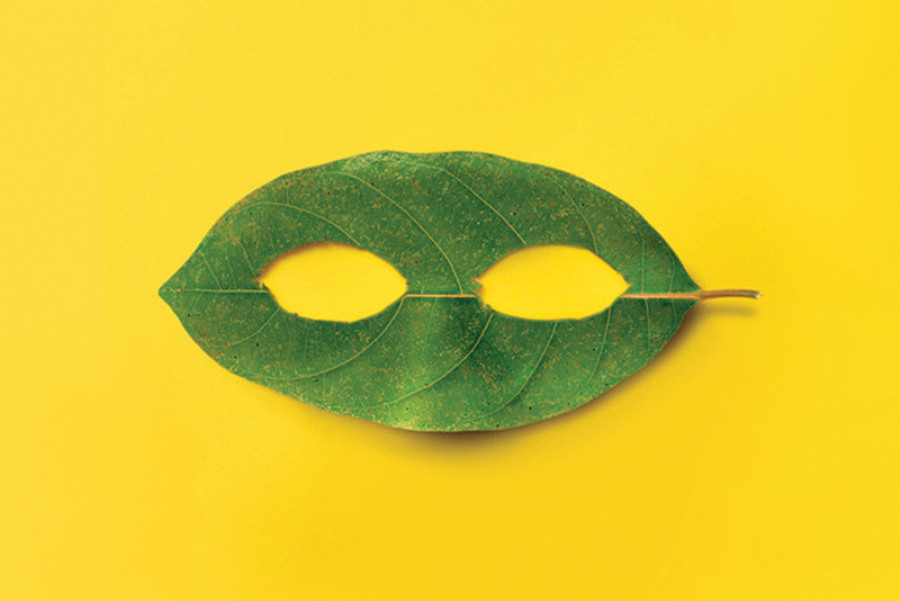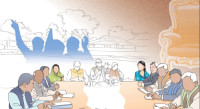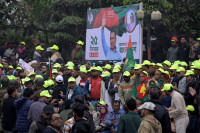Opinion
In the world’s eyes
Blind people are shown as being stupid, sinful and plain bad luck in most literatures
Pawan Ghimire
Our eyes that allow us to see also possess a symbolic meaning. All languages are replete with such extra referents. Words like sight, vision and blind are often used metaphorically. The beauty of the eyes has been described in various ways. In most literatures, eyes are the symbol of love, lust and jealousy. Literature is the door through which a blind person can see the world. Through literature, a blind person can see and rejoice in the beauty of nature. From historical times to the modern day, literature has always been the best medium to record the feelings, emotions and fantasies of the blind.
Blindness in their sense is very much like death. In the Nepali poem “Blind man on a revolving chair” by Bhupi Sherchan or the English poem “The blind men and the elephant”, it can be noticed that blind people are shown as being incomplete, infertile, unproductive, foolish, indecisive and unfit to be in a decision making position. From Shakespeare to Homer, and Charles Dickens to Leo Tolstoy, blindness means blank. In the following lines by Swinburne, vision is made to be the quintessence of life while blindness represents meaninglessness and death. “In his heart is a blind desire, in his eyes foreknowledge of death. His life is a watch or a vision between a sleep and a sleep.” Blindness entails a state of nothingness, a personal vacuum. Shakespeare has written, “He that is stricken blind cannot forget the precious treasure of his eyesight lost.”
Awful connotation
If we go through Webster’s dictionary of idioms and phrases, we will find more than 2,000 phrases beginning with the word blind. They all have negative meanings. A few phrases like blind faith, blind love, blind friendship, blind plant, blind drunk, blind’s painting, blind night and blind worms are in common use. The friendship and love done madly without knowing the partner’s background are called blind love and blind friendship. A plant without an apex and unable to bear fruit is called a blind plant. Improperly sketched paintings are called blind’s paintings. Comparing people’s infertility and lack of skill with their blindness is inhuman and against the dignity of the blind. Following these instances, it is important to recognise that negative stereotypes arise from the attitudes of the sighted toward the blind rather than from the latter’s own self-evaluation. Innumerable blind people regard themselves as being essentially normal and happy.
Famous quotations and proverbs that are used in our day-to-day life contain bitter satire against blindness. In everyday life, this emotion tends to mask the feeling of contempt or devaluation for the one being pitied. They almost never involve constructive empathy or compassion. A Nepali proverb which says that it is better to have a blind uncle than no uncle makes blind people a second choice. The proverb “There is no new or full moon for a blind bull” suggests that blind people are unaware of the changes happening in the world. They cannot change themselves with the change in time.
Not helpful
In most folk tales, blind people are considered to be signs of bad luck. Seeing one while stepping out of the house may predict an upcoming mishap. In some stories, the threat of being sent to a blind woman has been used to prevent children from getting into mischief. These stories never tried to give the message that blind persons are also normal human beings and have the same human sentiments like those who can see. In one ancient story, a king who wanted to have a son was advised by the royal priest to donate a lot of money to blind people so that his sins would be forgiven and he would get a son. This shows that blind people are those who beg outside temples or live at somebody’s mercy.
In most mythologies and epics, blindness has been described as divine punishment for sins committed in past lives. In the Hindu myth Ramayana, an angel who became blind for her faults committed in a past incarnation had a hard life in the city she lived in. She was treated harshly and made to eat leftover food. The Mahabharata, another great Hindu myth, has portrayed blind people in a different manner. The character Dhritarashtra, the king of Hastinapur who was blind, wished to make his son Duryodhana the king of Hastinapur by sidelining the deserving Pandavas. This revealed the greed and foolishness of blind people. His foolish desire became the cause of his extinction, giving the message that blind people are incapable of occupying a revolving chair.
Even in the story of the dutiful son Shravan Kumar, the status of his blind parents has not been expressed satisfactorily even though he loved them very much.
Furthermore, these negative perspectives have also been described in the Garuda Purana which says that a man who steals a book or a woman who stares at another man will be born blind in the next life. Such negative and pessimistic feelings expressed in the works of renowned writers, instead of eliminating superstitions and misconceptions about the blind, only help to spread more falsehoods in society. All
those who wish to write about the disabled should keep their feelings and dignity in mind. Removing negativities about the disabled is the healthiest way to establish good relations between the disabled and the able-bodied.
Ghimire is the Chairman of the Cricket Association of the Blind, Nepal




 8.12°C Kathmandu
8.12°C Kathmandu










%20(1).jpg&w=300&height=200)

